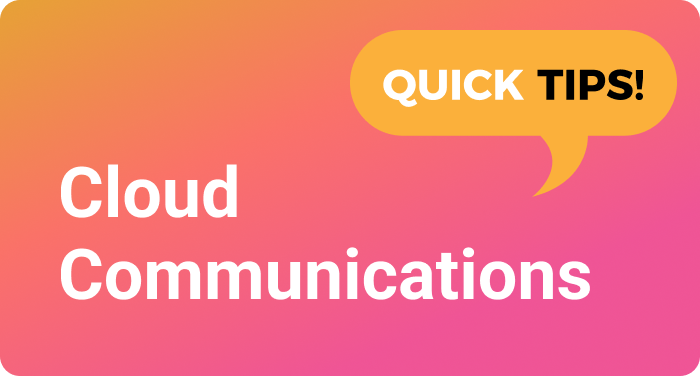When businesses had to develop virtual workplaces, a new user base encountered cloud communications for the first time. This quick adoption of cloud technology was required to keep operations running throughout the pandemic.
As digital transformation advances, those new cloud users, and many more who will follow, are sure to have questions and reservations about the technology. To help beginners, we’ve compiled a list of essential cloud communication tips.
What makes cloud communications important to business?
Cloud business communications solutions move the PBX switchboard to the enterprise networks. In addition, cloud-based communications solve user needs by various software or applications.
The growing number of remote workers during the Corona pandemic reinforced internet communication. The difficulty of supply and hardware prices made users realize the transition to cloud technology is not so complex. Moreover, call center employees do not have to be present at the site either. Therefore, cloud resources enhance customer engagement while reducing costs.
What are cloud services?
Cloud services became popular in the early 21st century, although their roots appeared in the 1960s. There was a concept of renting time on powerful computers with a fast processor and large storage space in that period. With technology development, cloud communication services became present in private and business environments.
What is cloud computing?
Cloud computing is a term used to describe the delivery of all hosted services over the Internet. Companies can outsource systems management responsibilities while renting storage space for their applications.
The basic types of phone systems in cloud computing
Video conferencing, instant messaging, social networks, and calendaring are now basic methods of communication around which new applications develop daily. This opens the possibility to choose the fastest, cheapest or most reliable at a given moment. In general, there are two basic types of telephony in clouds. These are internet telephony and unified communications (UCaaS).
How does internet telephony work?

Internet telephony or VoIP (Voice over Internet Protocol) is a technology that allows you to make voice calls using a broadband Internet connection instead of a regular telephone line. Certain VoIP services offer using a traditional phone connected to a VoIP adapter. VoIP system converts speech into digital data. Digital data can be stored and distributed on almost any device connected to the Internet. VoIP provides access to smart applications.
How does VoIP help small businesses?
The VoIP system allows you to send documents, pictures, and videos simultaneously while actively participating in the conversation – a great way to have quality meetings with clients or employees. In case of technical problems such as internet interruptions, calls can be forwarded to mobile phones or other devices.
VoIP systems adapt to the needs of companies, and their efficiency is practically flawless. Successful businesses around the world are reaping the competitive advantages Internet telephony provides. There are five primary benefits of VoIP telephony:
- VoIP system is cheaper. Traditional phone lines charge for each minute of call. You only pay a monthly fee for internet access in case of using VoIP.
- Integrated messaging, voice e-mail, number portability, caller ID with name, call waiting and call forwarding.
- Managing voice and data networks. This system provides insights into the calls: the time you receive the most calls from customers, frequently asked questions, etc.
- You can sign up on your VoIP phone from any location with internet access.
- The installation is effortless so no need to hire technicians.
If you are interested in exploring how VoIP can improve your organization, you can consult the Ringblaze experts’ team.
Unified communications model
The Unified Communications (UC) or Unified Services model fills the gap between VoIP and other package-based technologies. The model implies that all services are available through one device. The user gets a single number which is the same for all applications.
Another UC’s functionality is the concept of presence. Skype shows the status of all contacts by displaying the corresponding symbol in green, red, yellow, or white (notifying the other side if someone is available, busy, inactive, or offline). If the user isn’t next to the PC and doesn’t have a Skype app on a mobile, he won’t see instant messages. So the idea is to solve this.
Like other IT technologies, UC has found its place in the cloud. Instead of paying for app licenses, firms can outsource collaboration services. UCaaS or Unified Communications as a Service is a service set (instant messages, presence, telephony, video conferencing, etc.) located in the cloud and accessed online.
UCaaS providers have strong data security policies. It’s almost impossible to encrypt data-protected codes. When choosing UCaaS solutions, the company must examine how it fits strategic IT plans.
Before we move on with advice, we will answer one of the most frequently asked questions.
What is the API and how it works in internet telephony?
API stands for an Application programming interface. Imagine an API like a restaurant menu. The menu has a list of dishes along with their descriptions. Once you order the item, the restaurant’s kitchen provides you with ready meals. The only thing you don’t know is how the restaurant prepares that food.
Similarly, the API lists a bunch of operations describing what they do. You don’t need to know-how. You just need to know that it is available for use.
How API works in practice?
If you’ve visited a website and seen a message that the website is looking for your location – that website is trying to use the Geolocation API in your browser. Web browsers offer APIs like this to make it easier for programmers to access your site.
The purpose of the API in Internet telephony
The purpose of API is to simplify the conversation in the following way:
- Allow the user to talk to the bot
- Redirecting the call to the appropriate agent
- Enable the bot to reject or accept the phone calls
The API also serves to enhance collaboration through group calls. In those times of expansion, remote working API is needed to set up group meetings.
Steps to follow when implementing cloud communications
Now you’re armed with knowledge and you are ready to follow these tips on your path to implementing cloud communications.
1. Check if you are a potential user of cloud communications solutions?
If you have requirements for implementing new communication tools without investing in hardware, maintenance and infrastructure, you are a potential user of cloud telephony. Regardless of size, every company needs cloud telephony to improve employee productivity, communications services and customer relationship management.
2. Consider what you’re getting by implementing cloud communications
The rapid change in the business world brought a whole generation of cloud communications providers. They offer multichannel platforms that integrate conversations through various channels (social networks, messaging, live chat, AI, chatbot, etc.). Such scalable solutions easily fit into existing communications infrastructure and enable companies:
- To face market challenges
- Enhancing sales
- To adapt to the demands of digital business transformation
- To enhance the user experience through instant messages
- To reduce costs and increase profits
In parallel with these changes, there is a growing need for digital communication channels in customer centers. The digital transformation of contact centers can take a very long time. That’s why companies need agile service providers to integrate data communications on one platform while enabling:
- Access from multiple locations
- Instant messaging
- Data storage
- Analyze to optimization
- Hosting environment
Cloud phone system reduces costs through CRM integration. It uses software with a simple interface. The software directs inquiries to the most competent agent through analysis and management of multiple channels.
With the accelerated digitalization and work from home, cloud technology has increased significantly. The prognoses for the cloud communication platform market are that by 2027, the global market’s value will amount to 17.62 billion dollars, which would be a growth of 27.1 percent from 2020 to 2027. Research results speak on their own.

Primary advantages of the Cloud communications solutions:
- Automatic creation of Cloud infrastructure, without physical installation and connection of hardware
- A guarantee for the proper functioning
- The adaptability of multiple server operating systems within the same cloud application
- Scalability – rapid change of required resources through the control panel
Cloud is an ideal solution for the implementation of complex business information systems.
Cloud telephony will work even in case of technical failure of servers or parts of physical infrastructure. The data automatically becomes active on another server. You can access data and applications hosted on the cloud from anywhere in the world, at any time and from any device (phone, tablet or computer). Cloud communication service provider guarantees data security and privacy.
The cloud infrastructure automatically copies data to another physical server in the system. If one server crashes, your data will be available on another in a few minutes. Unlike the traditional infrastructure, in which you would need hours to enable the system, your applications are always available and secure in the Cloud system.
3. Find out what types of platforms exist
We often hear requests for clarification of private vs public cloud communications. We’re here to expose some secrets for you. To create the optimal, you have to understand all types of cloud communications. Below are a few types and their meanings.
Private cloud option
This type of cloud communications solution operates in an internal network. A private cloud can be physically located in a data center within your company or a cloud provider can host it. Services and infrastructure are always maintained in a private network.
This solution is typical for state-owned companies, healthcare, banks and insurance companies.
Public cloud option
This means that you will use the commercial cloud infrastructure offered by public cloud providers.
In the public cloud, you share the same hardware, storage, and network devices with other companies, while accessing and managing resources through a web browser. This doesn’t mean you are sharing your data, nor does it mean your data is not safe.
Hybrid cloud communications
Hybrid cloud communication is a “marriage” between your private infrastructure and the public cloud you use. This is a desirable way for companies to move some of their services to the public cloud while retaining private infrastructure. The main reason is to store the most sensitive data within a private cloud environment while still taking advantage of the public cloud provider. That way, you get the best of both approaches.
4. Check if your company is digitally mature for a cloud communication platform
Cloud is the driver of innovation. Cloud telephony enables the use of collaboration tools, data centers and data storage. This requires specific infrastructure capabilities. Many companies see cloud communications as a chance to try new tools without capital investments. Technologies like the cloud allow flexibility.
Assessing digital maturity is often the first step toward a cloud phone system. Like any effective implementation, this process requires the examination of existing systems. Outsourcing communication services requires changing the mentality.
Moreover, managing organizational changes is an essential paradigm on the road to digitalization. So, to move forward, you have to decide which route to take. Everyone must find their way with the support of a service provider.
5. Decide which cloud communications service provider to choose
Today, there are many cloud communications providers on the market. With the rising trend of remote work, we expect more providers soon. We investigated cloud service providers and selected several according to the features and customer ratings. You can include your customer support needs in making decisions.
Ringblaze phone system
The Ringblaze digital platform is one of the most complete and efficient systems that easily integrates into the existing client infrastructure. Unlike other collaboration tools, which might be challenging to implement and integrate, the Ringblaze system can be easily launched and flexibly optimized over time.
Ringblaze features
With this feature-rich communication solution you can:
- Create phone numbers for US and Canada
- Receive and make calls globally
- Collaborate within teams
- Forward calls
- Record calls
- Access to customer history and more
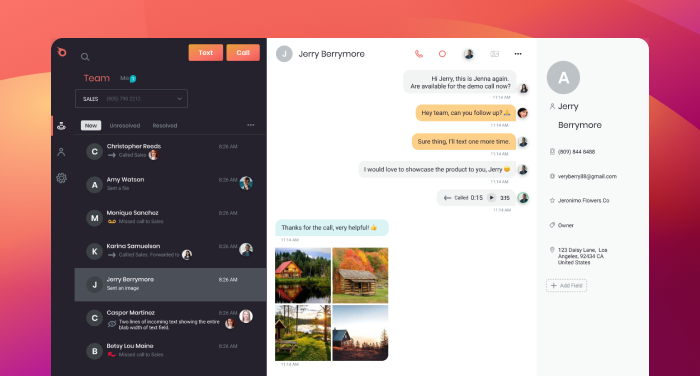

The users of Ringblaze
Ringblaze business phone system is the best for agencies, travel companies and e-commerce businesses.
Ringblaze pricing options
Start from $15 per user per month if billed annually. You can try your company phone number for free by signing up.
Twilio application solutions
Twilio takes care of business communications by installing phones, VoIP and messages on the desktop, web and mobile. Twillio supports whats app and SMS messages, voice, video and e-mail. This single platform contains cloud API, which replaces telecommunications hardware.
See also: Best Twilio alternatives
Twilio application features
- SMS marketing
- Programmable voice
- Programmable messaging
- Local, national and toll-free phone numbers
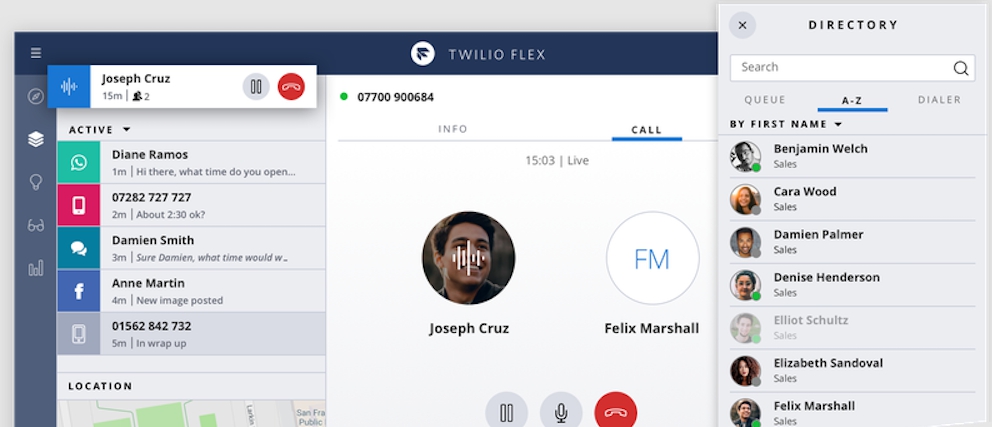
The users of Twilio
This cloud platform is designed for financial services, retail, real estate and healthcare companies.
Twilio application pricing options
Twilio offers flexible pricing options. You can pay for what you use without a contract.
Plivo communication platform
Plivo is a cloud communications provider whose solutions are rich in API. You can find solutions via messaging, voice and career platforms. There is also new omnichannel support for B2C users.
The users of Plivo
Plivo is designed for companies of all sizes, though its advanced features are the best for large e-commerce businesses.
Plivo communication features
- SMS API Platform
- MMS API platform
- Voice API
- SIP trunking for VoIP structure
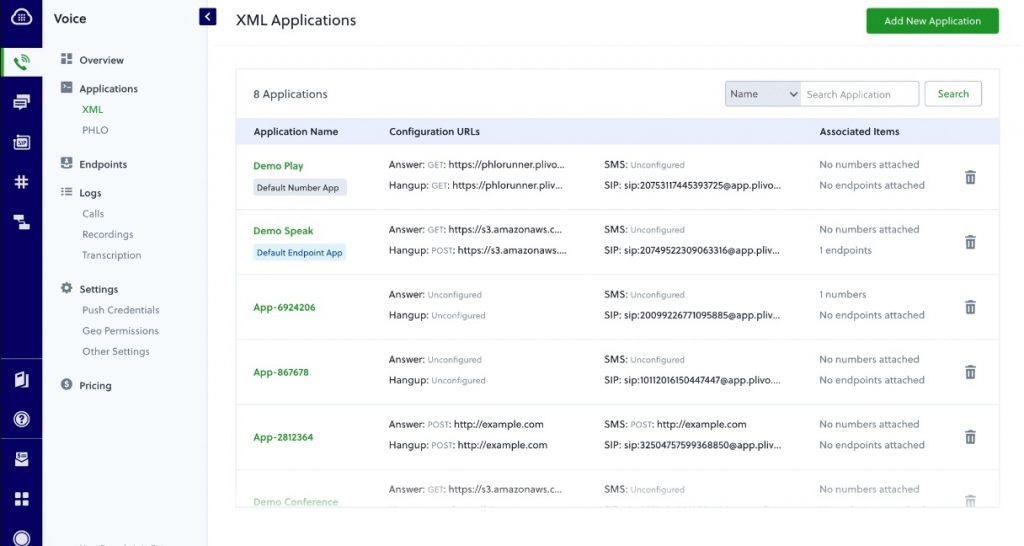
Plivo pricing options
You can try application options with free sign-up. The fee is monthly per unit of sent and received SMS or call. The new Omnichannel Contact Center for B2C customer service teams starts from $35 per user per month.
See also: Twilio vs Plivo
Vonage cloud communications provider
Vonage is a telephony solution that manages workflows and data communications through APIs, unified communications and contact centers.
Who are the users of Vonage
Vonage is a unified communications platform. It is suitable for healthcare, education, finance, retail, and e-commerce. Its unified solutions also help the transportation and manufacturing companies.
Vonage features for business
Some of Vonage’s features include:
- Video collaboration
- CRM integrations
- World numbers
The pricing starts from $19.99/line/month for mobile and desktop applications.
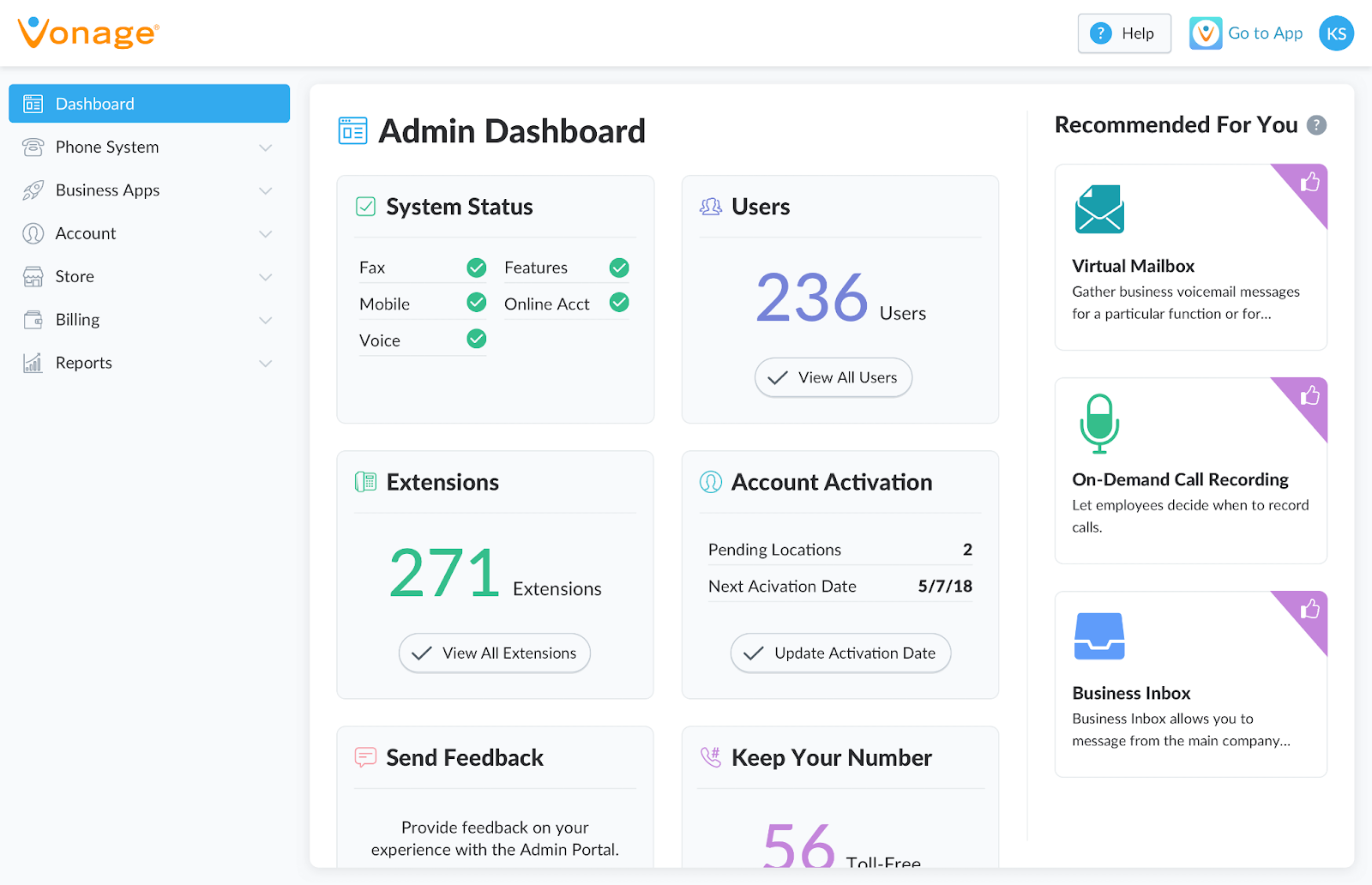
Telnyx communications API
Telnyx is a cloud platform that processes numerous international API transactions. This cloud technology enables FAX document transmission and supports Global wireless IoT connectivity.
The features of Telnyx
- Elastic SIP trunking
- Voice API
- SMS API
- Documents exchange via fax
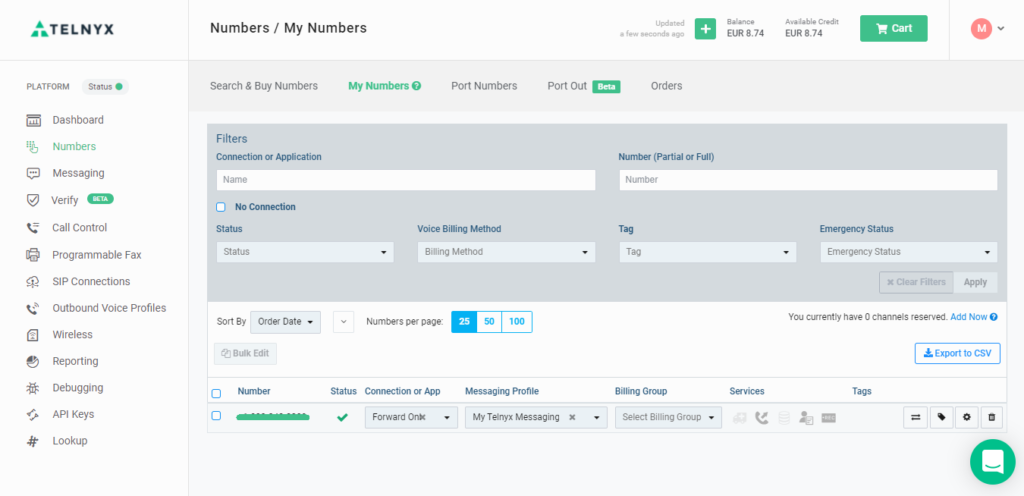
The primary users of Telnyx are large international companies. They offer pricing for what you spend.
Conclusion
Companies opt for cloud migration to respond to a practical need such as business continuity. Effective migration does not imply mirroring existing systems to a new environment. The ultimate goal is to make businesses more resilient.
The bottom line is that you don’t have to engage in this process alone when it comes to planning for cloud migration. Share your experience, ask questions or schedule a personalized consultation with Ringblaze experts.
Suppose you are interested in exploring how cloud communications can improve your organization in more detail. In that case, you can try Ringblaze for free and decide for yourself.
Cloud communications: FAQs
With cloud communication, you can make calls or send messages over the Internet, via third-party services rather than on-premise devices. An example of this is VoIP, which enables voice calls to be transmitted through the Internet instead of using traditional telephone lines.
The main advantages of cloud communication include cost-effectiveness, easy scalability, flexibility and mobility. These solutions are usually more reliable than phone lines and can be integrated with other business applications.
Originally published on December 13, 2021. Updated February 22, 2024.
